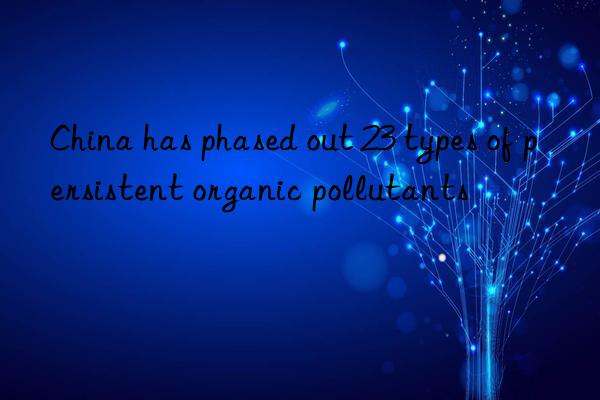
The relevant person in charge of the Solid Waste and Chemicals Department of the Ministry of Ecology and Environment of China told reporters on the 12th that as of now, China has completely eliminated 23 types of persistent organic pollutants controlled by the Stockholm Convention on Persistent Organic Pollutants. The compliance target of off-line disposal of polychlorinated biphenyl-containing power equipment was completed ahead of schedule, and the emission intensity of dioxins in major industries across the country dropped significantly.
The person in charge stated that persistent organic pollutants have the potential of persistence, bioaccumulation and long-distance environmental transport, and have adverse effects on human health or the ecological environment. In order to reduce, eliminate and prevent persistent organic pollutant pollution, and protect human health and the ecological environment from persistent organic pollutants, the international community reached the above convention in 2001.
A few days ago, the Ministry of Ecology and Environment and relevant departments of the National Coordination Group for the Implementation of the Stockholm Convention jointly issued the "Announcement on Environmental Risk Control Requirements for Five Types of Persistent Organic Pollutants including Polychlorinated Naphthalene". The announcement stipulates environmental risk control requirements, including the prohibition of the production, use, import and export of hexachlorobutadiene, polychlorinated naphthalene, pentachlorophenol and their salts and esters; the prohibition of the production, use, import and export of short-chain chlorinated paraffins , retaining nine specific exemption uses such as additives used in the production of conveyor belts in the natural and synthetic rubber industry, the exemption period will end on December 31, 2023, and prohibit the production, use, import and export of decabromodiphenyl ether, etc.
It has been 19 years since the above-mentioned convention came into force in China. The relevant person in charge of the Solid Waste and Chemicals Department of the Ministry of Ecology and Environment stated that as of now, China has completely phased out 23 types of persistent organic pollutants controlled by the convention, and completed The fulfillment target of the off-line disposal of benzene power equipment has cleaned up and disposed of more than 100,000 tons of persistent organic pollutant waste at hundreds of points left over from history, and the emission intensity of dioxins in major industries in the country has dropped significantly. Through compliance, the production and environmental discharge of hundreds of thousands of tons of persistent organic pollutants have been reduced each year. The content of organochlorine persistent organic pollutants in environmental and biological samples has generally shown a downward trend, making an important contribution to the improvement of environmental quality.



 微信扫一扫打赏
微信扫一扫打赏
